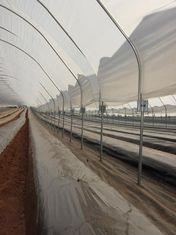
The growth of the UK soft-fruit industry could be in jeopardy if a ruling that polytunnels need planning permission is not overturned, producers told the High Court today.
The Hall Hunter Partnership, which owns Tuesley Farm, just outside Godalming, Surrey - the majority of which is in a Green Belt area - is battling to overturn a decision that erecting polytunnels constitutes “development” under the 1990 Town and Country Planning Act - and therefore requires planning permission.
Timothy Straker, QC at the High Court, argued that planning permission should not be required for polytunnels because they are “an agricultural use of land”.
He said: “Polytunnels can properly be said to be vital to agriculture, and to be the norm as far as the growth of soft fruit is concerned.”
Straker added that the tunnels could not be described as “buildings” as they are erected on a rotational basis.
Tunnels were erected by the Hall Hunter Partnership over some 45.6 hectares between March and November 2004 - with a maximum coverage at any one time of just under 29ha. The area increased to 60.8ha and 39ha respectively in the 2005 season.
The potential landmark case came about after Waverley Borough Council served planning enforcement notices in August 2004 on the Hall Hunter Partnership requiring it to stop using polytunnels for the large-scale production of strawberries, raspberries and blackberries.
A 13-day planning inquiry that ended in October 2005 ruled planning permission was required.
The case is being watched by the £200 million soft-fruit industry and rural communities across the UK.
Opponents at the High Court include the Tuesley Farm Campaign, set up by a group of more than 80 local families, said the polytunnels and the accompanying caravans are “a genuine blight on this scenic landscape”.
Laurence Olins, chairman of British Summer Fruits, present at the High Court, stressed the importance of the case to the soft-fruit industry. He said: “It is worth £200 million to UK producers, and we believe that if this case is lost, 50 per cent of that business could be put at risk.
“The UK soft fruit market is increasing every year. The market for strawberries has grown this year by six per cent, raspberries by 23 per cent and blackberries by 50 per cent.”
Planning laws would restrict UK soft-fruit production and allow producers from Europe and the US, American to take their market share, said Olins.
The High Court hearing is expected to last two days.



